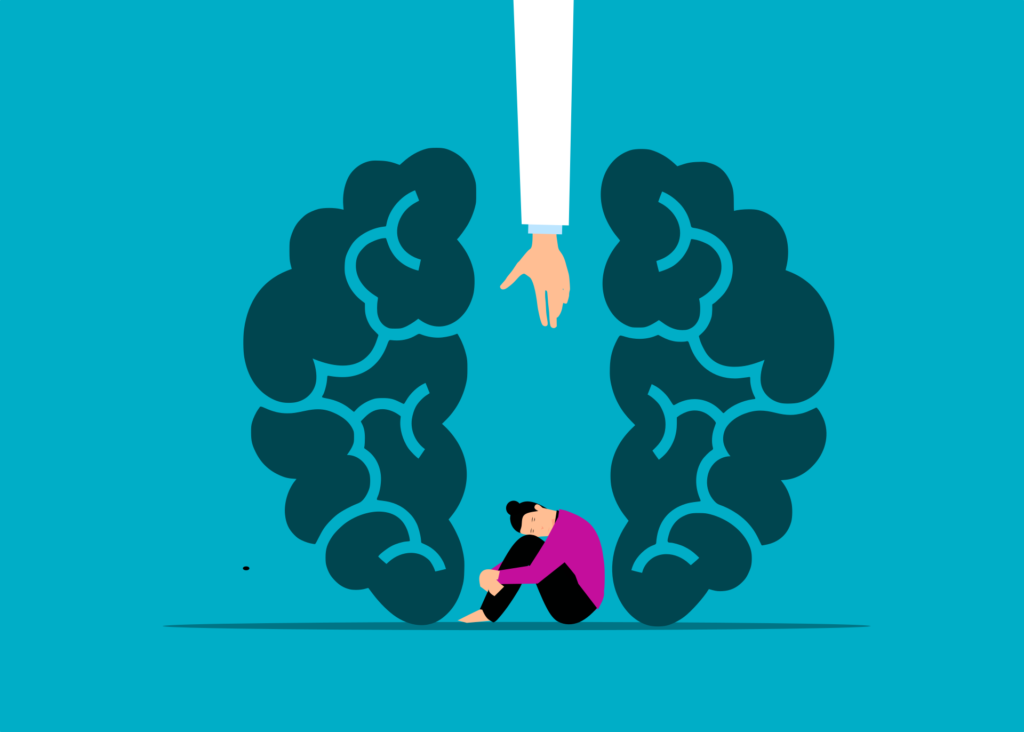October is Mental Health Awareness Month. This is a time to acknowledge that mental health is equally important as physical health. In fact, the two are inextricably connected.
- Depression has been linked to chronic illnesses such as asthma, cancer, diabetes, stroke, cardiovascular disease, and arthritis. More commonly, depression often results in fatigue, digestive issues, and headaches.
- People with mental health conditions have more difficulty dealing with a chronic illness, making mortality rates higher for those with depression and other mental health diagnoses.
- Sleep is essential to our overall health. People with mental health issues are more likely to suffer from poor sleep due to insomnia, restlessness, or sleep apnea.
Mental health issues are not uncommon. Over 50% of Americans will be diagnosed with a mental disorder or illness at some point in their lifetime — and those are only the people who are diagnosed. There are likely many more who never seek care.
Mental Health Issues in Doctors
Contrary to the pedestal many put doctors on, physicians are not superhuman. Doctors, nurses, and other healthcare workers are normal men and women who need to care for their mental health as much as anyone else. In fact, because of the incredibly stressful demands of their jobs, doctors may need to pay even more attention to their mental health than those in other professions.
- Compared to other professions, physicians have a higher risk of death by suicide. Roughly 300-400 doctors die by suicide in the USA every year.
- A survey presented at the American Psychiatric Association in 2020 showed that as many as 36% of frontline doctors suffered from PTSD — and this was before the pandemic, we estimate this has significantly increased in 2022
- Nearly 40% of physicians report being averse to seeking mental health care because they were concerned it would jeopardize their careers.
- An investigation by the American Medical Association and the Mayo Clinic confirmed that medical board licensing processes deter physicians from getting mental health care.
Sadly, those who are committed to caring for other people during the most challenging times of their lives are not able to easily access mental health care without fear of repercussions. Many doctors resort to clandestine care, opting to find an out-of-city therapist who agrees to payment in cash—no billing to an insurance company or paper trail of any kind.
Subjecting doctors to these kinds of unrealistic expectations is not only destructive to their mental health, but it is also detrimental to patient care. Doctors who are not treated for anxiety or depression make more medical errors than those who get competent care.
Burnout in Healthcare Workers

Image courtesy of Mohamed_hassan on Pixabay
The time to heal our healthcare system is now.
Burnout is an occupational stress phenomenon primarily attributable to our healthcare systems. By listening to our intuition, we take back control over our response to stress and burnout and gain a broader perspective, showing us how we can positively shift our own life to build in necessary buffers.
Even healers need healers, which is why I am working to bring the medical community together to spark change and unify standards across our national healthcare system through evidence-based education, podcasting, and many other resources. By unifying healthcare organizations and leaders, we can create a coalition of healthcare professionals committed to actionable change — together.
Health workers have been operating in survival mode for far too long, but we must believe that change is possible.
Burnout Resources for Doctors, Nurses, and all Healthcare Workers
A vital step toward positive change in the medical culture is a well-coordinated plan that provides government, health systems leadership, payers, health workers, educators, and leaders in other sectors with the tools and approaches required to drive policy and structural change:
National Plan for Health Workforce Well-Being from the National Academy of Medicine
Resource Compendium for Health Care Worker Well-Being
Remove Intrusive Mental Health Questions from Licensure and Credentialing Applications
AMA Recovery Plan for America’s Physicians
ACOEM Clinician Well-Being – Practice Resources
Publications Cited/More Information:
https://emedicine.medscape.com/article/806779-overview
https://www.mentalhealth.org.uk/explore-mental-health/a-z-topics/physical-health-and-mental-health
https://www.cdc.gov/mentalhealth/stress-coping/healthcare-workers-first-responders/index.html
https://hr.uw.edu/cfd/2022/10/04/mental-health-awareness-month/
https://www.nytimes.com/2022/03/30/opinion/doctors-mental-health-stigma.html
https://pubmed.ncbi.nlm.nih.gov/28982484/
https://jamanetwork.com/journals/jamanetworkopen/fullarticle/2755851
